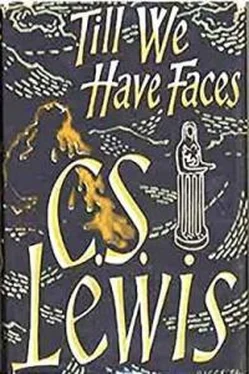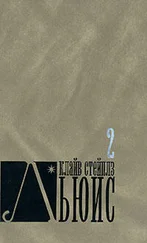“I don’t know that anyone’s been over the saddle. At the Offering, even the priests come no further than the Tree. We are very near the bad part of the Mountain; I mean, the holy part. Beyond the Tree it’s all gods’ country, they say.”
“Then it is you must stay behind, Bardia. They can’t do worse to me than they’ve done already.”
“I’ll go where you go, Lady. But let’s talk less of them, or not at all. And first, I must go back and get the horse.”
He went back (and for a moment out of sight—I stood alone on the edge of the perilous land) to where he had tied the horse to a little stunted bush. Then he rejoined me, leading it, very grave, and we went forward.
“Carefully,” he said again. “We may find we’re on the top of a cliff any moment.” And indeed it looked, for the next few paces, as if we were walking straight into the empty sky. Then suddenly we found we were on the brow of a steep slope; and at the same moment the sun—which had been overcast ever since we went down into the black valley—leaped out.
It was like looking down into a new world. At our feet, cradled amid a vast confusion of mountains, lay a small valley bright as a gem, but opening southward on our right. Through that opening there was a glimpse of warm, blue lands, hills and forests, far below us. The valley itself was like a cleft in the Mountain’s southern chin. High though it was, the year seemed to have been kinder in it than down in Glome. I never saw greener turf. There was gorse in bloom, and wild vines, and many groves of flourishing trees; and plenty of bright water—pools, streams, and little cataracts. And when, after casting about a little to find where the slope would be easiest for the horse, we began descending, the air came up to us warmer and sweeter every minute. We were out of the wind now and could hear ourselves speak; soon we could hear the very chattering of the streams and the sound of bees.
“This may well be the secret valley of the god,” said Bardia, his voice hushed.
“It’s secret enough,” said I.
Now we were at the bottom, and so warm that I had half a mind to dip my hands and face in the swift, amber water of the stream which still divided us from the main of the valley. I had already lifted my hand to put aside my veil when I heard two voices cry out; one, Bardia’s. I looked. A quivering shock of feeling that has no name (but nearest terror) stabbed through me from head to foot. There, not six feet away, on the far side of the river, stood Psyche.
What I babbled, between tears and laughter, in the first wildness of my joy (the water still between us) I don’t know. I was recalled by Bardia’s voice.
“Careful, Lady. It may be her wraith. It may—ai! ai!—it is the bride of the god. It is a goddess.” He was deadly white, and bending down to throw earth on his forehead.
You could not blame him. She was so brightface, as we say in Greek. But I felt no holy fear. What?—I to fear the very Psyche whom I had carried in my arms and taught to speak and to walk? She was tanned by sun and wind, and clothed in rags; but laughing, her eyes like two stars, her limbs smooth and rounded, and (but for the rags) no sign of beggary or hardship about her.
“Welcome, welcome, welcome,” she was saying. “Oh, Maia, I have longed for this. It was my only longing. I knew you would come. Oh, how happy I am! And good Bardia, too. It was he that brought you? Of course; I might have guessed it. Come, Orual, you must cross the stream. I’ll show you where it’s easiest. But, Bardia—I can’t bid you across. Dear Bardia, it’s not——”
“No, no, Blessed Istra,” said Bardia (and I thought he was very relieved). “I’m only a soldier.” Then, in a lower voice, to me, “Will you go, Lady? This is a very dreadful place. Perhaps——”
“Go?” said I. “I’d go if the river flowed with fire instead of water.”
“Of course,” said he. “It’s not with you as with us. You have gods’ blood in you. I’ll stay here with the horse. We’re out of the wind and there’s good grass for him here.”
I was already on the edge of the river.
“A little further up, Orual,” Psyche was saying. “Here’s the best ford. Go straight ahead off that big stone. Gently! make your footing sure. No, not to your left. It’s very deep in places. This way. Now, one step more. Reach out for my hand.”
I suppose the long bedridden and indoors time of my sickness had softened me. Anyhow, the coldness of that water shocked all the breath out of me; and the current was so strong that, but for Psyche’s hand, I think it would have knocked me down and rolled me under. I even thought, momentarily amid a thousand other things, “How strong she grows. She’ll be a stronger woman than ever I was. She’ll have that as well as her beauty.”
The next was all a confusion—trying to talk, to cry, to kiss, to get my breath back, all together. But she led me a few paces beyond the river and made me sit in the warm heather and sat beside me; our four hands joined in my lap, just as it had been that night in her prison.
“Why, Sister,” she said merrily, “you have found my threshold cold and steep! You are breathless. But I’ll refresh you.”
She jumped up, went a little way off, and came back, carrying something; the little cool, dark berries of the Mountain, in a green leaf. “Eat,” she said. “Is it not food fit for the gods?”
“Nothing sweeter,” said I. And indeed I was both hungry and thirsty enough by now, for it was noon or later. “But oh, Psyche, tell me how——”
“Wait!” said she. “After the banquet, the wine.” Close beside us a little silvery trickle came out from among stones mossed cushion–soft. She held her two hands under it till they were filled and raised them to my lips.
“Have you ever tasted a nobler wine?” she said. “Or in a fairer cup?”
“It is indeed a good drink,” said I. “But the cup is better. It is the cup I love best in the world.”
“Then it’s yours, Sister.” She said it with such a pretty air of courtesy, like a queen and hostess giving gifts, that the tears came into my eyes again. It brought back so many of her plays in childhood.
“Thank you, child,” said I. “I hope it is mine indeed. But, Psyche, we must be serious; yes, and busy too. How have you lived? How did you escape? And oh—we mustn’t let the joy of the moment put it out of our minds—what are we to do now?”
“Do? Why, be merry, what else? Why should our hearts not dance?”
“They do dance. Do you not think—why, I could forgive the gods themselves. I’ll shortly be able to forgive Redival; perhaps. But how can—it will be winter in a month or less. You can’t—Psyche, how have you kept alive till now? I thought, I thought——” But to think of what I had thought overcame me.
“Hush, Maia, hush,” said Psyche (once more it was she who was comforting me). “All those fears are over. All’s well. I’ll make it well for you too; I’ll not rest till you’re as happy as I. But you haven’t yet even asked me my story. Weren’t you surprised to find this fair dwelling–place, and me living here; like this? Have you no wonder?”
“Yes, Psyche, I am overwhelmed in it. Of course I want to hear your story. Unless we should make our plans first.”
“Solemn Orual,” said Psyche mockingly. “You were always one for plans. And rightly too, Maia, with such a foolish child as me to bring up. And well you did it.” With one light kiss she put all those days, all of my life that I cared for, behind us, and began her story.
“I wasn’t in my right mind when we left the palace. Before the two temple girls began painting and dressing me they gave me a sweet, sticky stuff to drink—a drug, as I guess, for soon after I had swallowed it everything went dreamlike, and more and more so for a long time. And I think, Sister, they must always give that to those whose blood is to be poured over Ungit, and that’s why we see them die so patiently. And the painting on my face helped the dreaminess too. It made my face stiff till it didn’t seem to be my own face. I couldn’t feel it was I who was being sacrificed. And then the music and incense and the torches made it more so. I saw you, Orual, at the top of the stairway, but I couldn’t lift even a hand to wave to you; my arms were as heavy as lead. And I thought it didn’t matter much, because you too would wake up presently and find it was all a dream. And in a sense it was, wasn’t it? And you are nearly awake now. What? still so grave? I must wake you more.
Читать дальше











